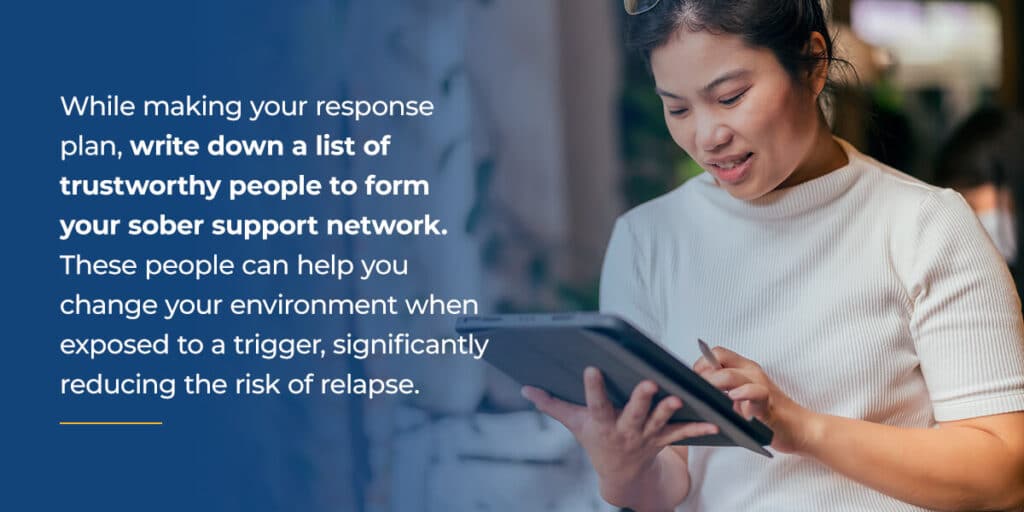

Undergoing addiction treatment is only one part of the recovery process. You can expect to encounter unique challenges on your healing journey, including triggers that can cause cravings or temptations. During treatment, many people experience triggers related to complex emotions or their history of substance use. Fortunately, you can learn how to stop addiction triggers and prevent a relapse.
Below, you’ll learn about the causes of addiction relapse and how to create a practical plan to continue on your path to recovery.
An addiction trigger is anything in your life that brings up the temptation, idea, thought or sensation of returning to substance use. Your triggers can be anything that causes a relapse. Triggers don’t have to be physical — they can arise from an emotion, behavior or even a word. Some addiction triggers don’t have anything to do with substance use.
Triggers are one of the primary causes of relapse. You’ll usually learn tools for identifying and coping with these during an addiction treatment program. This self-evaluation is just as critical as getting professional counseling from an addiction specialist.
Triggers are among the most common recovery experiences. These can be any physical or psychological factors that remind you of substance use and cause temptation. Some internal and external triggers for addiction relapse include:
Even if you prepare for your triggers, there’s still the chance of encountering them unexpectedly. For example, you may bump into someone you used to use substances with, catching you off-guard. It’s essential to learn how to overcome addiction triggers you’re aware of and those you aren’t, preventing relapse and keeping you on the road to recovery.
If you take the appropriate steps, you can overcome your addiction triggers, even those you encounter unexpectedly. Below are some things you can do to prevent a relapse.
Identifying your triggers is the first step in a sensible relapse prevention strategy. It’s also essential to understand that experiencing triggers during addiction recovery isn’t a sign of weakness or failure. Avoid self-judgment, shame and guilt if you feel triggered.
Ways you can recognize your triggers include:
Once you classify your triggers, creating a plan to overcome them and prevent relapse will be easier.
Now that you know your triggers, you can develop a response plan that’s easy to follow when you’re stressed or overwhelmed. The steps can include the following:
With a simple plan like the one above, you can manage your triggers and reduce your risk of relapse.

While making your response plan, write down a list of trustworthy people to form your sober support network. These people can help you change your environment when exposed to a trigger, significantly reducing the risk of relapse. You can choose anyone to be part of your support network, but ensure they understand your goals and what you’re going through. Some examples of people you can have in your support network include:
Finding activities to distract yourself when you’re experiencing triggers can be a helpful way to avoid relapse. Fun hobbies can also fill the hours you used to spend taking drugs or thinking about substance use. Some things to try include:
These activities can also be an excellent way to deal with stress and other negative emotions that may have caused you to use substances before, which can prevent a relapse.
If you’re having trouble developing a response plan, identifying your triggers or experiencing intense cravings that are causing you more stress, it could signify that you should seek professional treatment. Even if you’ve gone through treatment before, seeking additional sessions with a therapist or attending group meetings can help you recenter yourself and find new ways to cope.
With guidance from a professional, you can easily identify your triggers and develop appropriate responses to manage them. You can even discover new strategies to take your mind off your cravings and prevent relapse.
If you’re recovering from addiction or have already gone through an addiction treatment program but are still struggling with cravings and triggers, Hope for Tomorrow is here for you. With medication-assisted treatment and other therapies, we work to help people overcome addiction and get their lives back on track. Our team provides a therapeutic and comfortable environment where you can work through the recovery process without fear of judgment.
We use evidence-based treatments that have proven to facilitate recovery, and our compassionate experts will work closely with you to uncover the root cause of your substance use disorder. We can also guide you as you identify your triggers and find ways to manage them so you can prevent relapse. Contact us today to learn more about how our tailored programming can benefit you.